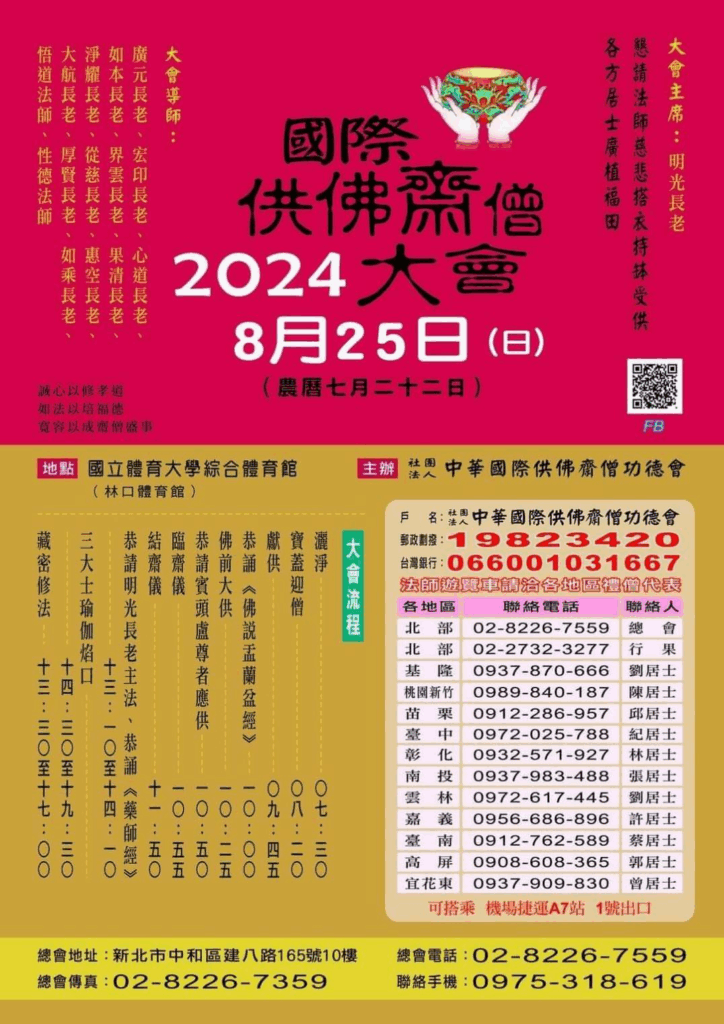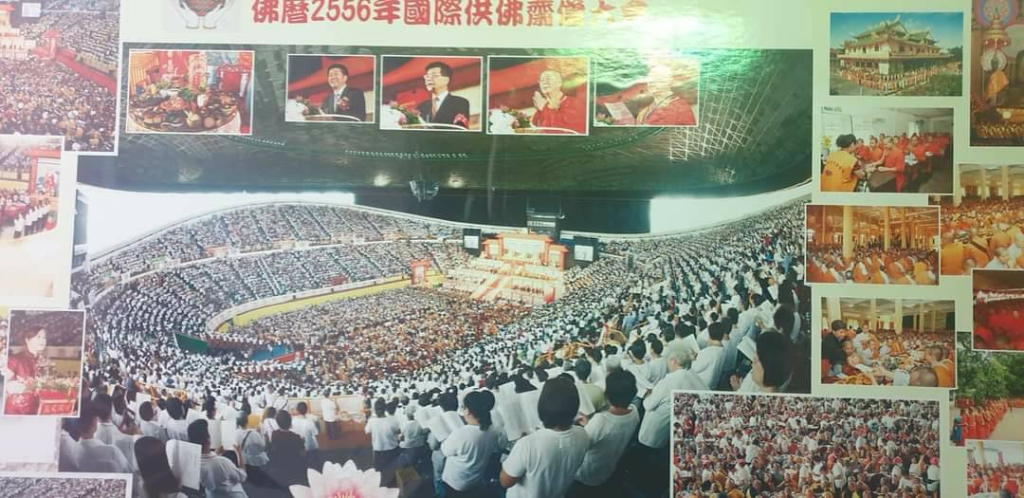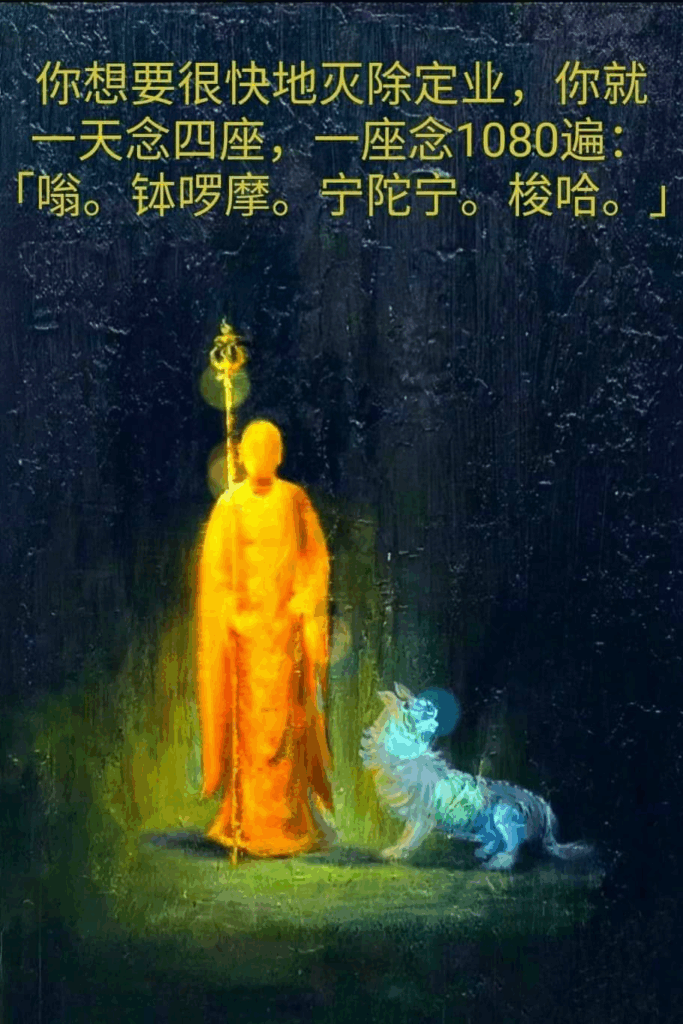[Thousand Monks’ Feast]
[Ten Thousand People Reciting the Medicine Buddha Sutra]
I met Brother Taitung during the 49-lamp ceremony for the Medicine Buddha in Hualien in March.
Brother Taitung invited me to participate in the International Buddhist Offering and Monk Feast.

He said this year was the 20th anniversary of the China International Buddhist Offerings and Monks Merit Ceremony, and that this was their first meeting. He then……………………
handed him two hardcover, theatrically thick, introductory books about the China International Buddhist Offerings and Monks Merit Ceremony, and told him to study them.

Since I live in Linkou, New Taipei City, I figured I wouldn’t refuse.
I also remembered hearing Teacher Wu teach:
Self-power, other-power (blessing power), the power of dependent origination in the Dharma Realm…
What was particularly special was learning about the China International Buddhist Offerings and Monk Feeding Merit Association, which has long offered Buddhist offerings and monk feedings both domestically and internationally.
Externally, this includes Buddhist monks from across the Taiwan Strait, Tibetan Buddhism, and Southeast Asia, like the Ten Directions Zen Monastery;
Individually, this includes monks in the remote mountainous areas of Hualien and Taitung.
I’m grateful to have participated in the private offering; the monks are so compassionate.
I’m grateful for the opportunity to privately participate in the Taitung Buddhist Offering.
It truly felt like seeing a different Taitung from a parallel universe.
The master who had been in seclusion at Guanshan for 15 years,
went to Guanshan Jingyuan Temple to offer alms to the masters.


One morning while staying in Luye,
I took the kids to buy vegetables from the roadside vegetable vendors at the Luye morning market. We bought them and offered them to the monks. We felt a sense of accomplishment because we bought them all.
One of the vegetable vendors in Luye had previously served at Luye Cihuitang. Although illiterate, she practiced spiritual cultivation and invited me to visit her.
She once copied the Lotus Sutra word for word. She also brought a lot of vegetables to Guanshan Jingyuan Temple to offer to the monks. The kind woman knew to go and offer them to the monks!

The monk I met at the Four Minds of Thoughts in Hualien is currently at Jingyuan Temple.
When the monk saw me bringing the children to offer alms to the monks,
he mentioned a magical and kind woman from Luye who knew me.
I thought to myself, it must be the woman selling vegetables on the roadside at the Luye morning market. What a magical coincidence!

Amazingly, someone even asked if I could invite Master Shuinandong,
and Master Jiaxian from Kaohsiung, to participate in the Thousand Monks’ Feast.
Coincidentally, they both said they would participate.
Thank you, Master, for your compassionate acceptance of the offerings.
[Thousand Monks’ Feast]
The Origin and Merits of the Buddhist Thousand Monks’ Feast
The Ullambana Sutra


August 18 (Sunday) – The 15th day of the seventh lunar month (the 14th day of the sixth lunar month in the Tibetan calendar) – Buddha’s Joyful Day (Monk’s Treasure Day). Recite Amitabha Buddha, observe the fast to eliminate sins for 200 kalpas, six and ten fasting days, chant the sutras of Auspicious Goddess, and recite the precepts. Hungry Ghost Festival
What is the “Thousand Monks’ Fast”?
As the name suggests, the Thousand Monks’ Fast refers to a ceremony where one thousand monks offer alms to one another simultaneously. Ancient emperors held Thousand Monks’ Fasts for ceremonies like praying for blessings and warding off disasters, enthroning a crown prince, celebrating national mourning, ensuring harvests during droughts and floods, receiving ordination, offering prayers for the deceased, and fulfilling vows.
Tracing back to ancient times, the earliest practice of the Thousand Monks Fast probably dates back to the Ullambana Sutra. Maudgalyayana, the Buddha’s disciple with the greatest clairvoyance, saw his mother in the realm of hungry ghosts, her skin and bones joined together, suffering day and night without food. Maudgalyayana filled his bowl with rice and offered it to his mother. However, as retribution for her bad karma, the rice turned to flames. Determined to save his mother from this suffering, Maudgalyayana asked the Buddha for a remedy. The Buddha instructed Maudgalyayana to pray on the fifteenth day of the seventh month, the day of the Sangha’s Self-Examination. (During the Indian rainy season, monks observe the 90-day summer retreat, strictly observing the precepts and purifying their conduct. On the fifteenth day of the seventh month, the retreat concludes. The monks perform self-examination, listing their faults and confessing their sins in public. The Buddhas of the ten directions rejoice in their diligent practice during the retreat, so it is also called the Buddha’s Joyful Day.) He placed a hundred kinds of food in a basin and offered it to the Buddhas and monks of the ten directions. This extraordinary and vast merit saved his mother from the realm of hungry ghosts, and his parents for seven generations were liberated. This practice later became a popular custom of offering food and other things to the monks of the ten directions on this day.
For this reason, King Bimbisara of Rajagriha regularly provided food offerings to a thousand monks, even after his death. His son, King Ajatasatru, followed his instructions and also regularly provided food offerings to a thousand monks in his palace. Four months after the Buddha’s passing, Mahakasyapa gathered a thousand people at the Seven Leaves Cave outside Rajgir for the first compilation of the Buddhist canon. To ensure that the ceremony was complete, King Ajatasatru ordered daily food offerings, and Kasyapa did not take more than one person, but only a thousand. This was the first thousand-sangha feast in the Buddha’s time, and it also marked the beginning of monks no longer having to beg for alms and instead accepting regular offerings from donors.
After Buddhism arrived in my country, successive royal nobles, starting with the Southern and Northern Dynasties, often held Thousand-Monk Fasts. For example, Emperor Hou of Chen invited Master Zhiyi to bestow Bodhisattva precepts upon the Crown Prince and held a Thousand-Monk Fast. Shortly thereafter, the Sui army captured Nanjing. In the eleventh year of the Sui Kaihuang reign, Prince Yang Guang of Jin (Emperor Yang) invited Master Zhiyi to bestow Bodhisattva precepts upon him. The king bestowed upon him the title “Wise Man” and held a feast for the thousand monks. After Master Zhizhe’s passing, in the first year of the Daye reign, Yang Guang built a temple at the foot of Mount Tiantai based on the drawings left by the master. After ascending the throne, he personally granted the name Guoqing Temple and held a Thousand-Monk Fast on November 24th, the anniversary of the master’s death. In the eighth year of the Tang Zhenguan reign, Empress Dowager Mu built Hongfu Temple. Shangshu Yu Shinan submitted a memorial to the court, recounting his early serious illness and vowing to rely on the Buddha’s power to hold a Thousand-Monk Fast on the day of his recovery., wishing for everlasting freedom from illness and suffering in all lifetimes, and eternal detachment from all enemies and relatives for seven generations. The emperor was indeed cured, and moved by the memorial, he also held a feast for a thousand monks in Empress Dowager Mu’s honor. Emperor Yizong also held a feast for ten thousand monks in the Forbidden City. In the first year of the Tongguang reign of Emperor Zhuangzong of the Later Tang Dynasty, a feast for a thousand monks was also held in the inner palace.
Historical evidence shows that the Thousand Monks’ Feast was auspicious, having been held in the inner palace of the imperial palace. Now, it will be recreated through time and space at the Linkou Gymnasium in Linkou, New Taipei City in 2024! All are welcome to join in the celebration!
[Prayer]
May the merits of offering to the Sangha from all directions bring peace to the world and happiness to all people. May all sentient beings with affinity be able to cultivate bodhicitta, cultivate merit, accumulate good deeds, ward off disasters, and overcome obstacles.
[Gratitude]
Thank you to the approximately 40 members of the group for your enthusiastic participation.
We all practiced the Six Perfections of Giving together and achieved success together.
[Medicine Buddha Sutra: One should practice offerings to the Dharma master: giving all the necessities of life, leaving nothing to be lacked. In this way, one will be protected and remembered by all Buddhas, and all wishes will be fulfilled, leading to the attainment of Bodhi.] 】



Let’s quickly achieve our wishes together!
The Thousand Monks’ Feast is like a collective practice, a collective achievement;
Coincidentally, there was a recitation of the Medicine Buddha Sutra in the afternoon.
Ten thousand people reciting the Medicine Buddha Sutra has the same blessing power as ten thousand copies of the Medicine Buddha Sutra!
The 44 Great Vows of the Seven Medicine Buddha Sutras: The Guru embraces wisdom without hindrance, possesses vast power and wealth, and attains enlightenment in this lifetime for the benefit of all beings.
The First Great Vow of Medicine Buddha:
May all beings be equal to me, my own light illuminating the ten directions. Adorned with the thirty-two marks and eighty characteristics, I will make all beings equal to me.
We sincerely invite everyone to join us in the joyful celebrations after the pandemic. We welcome everyone to join us in the celebrations! The Thousand Monks’ Feast, a tradition passed down for millennia.
https://www.facebook.com/share/p/MQcMVdiYxKujjNBj/?mibextid=oFDknk
https://www.facebook.com/share/p/voGxH2tA2zVAH67m/?mibextid=oFDknk
https://www.facebook.com/share/p/bbTiR8u398gt2Quo/?mibextid=oFDknk
#Quantum Entanglement
#Altruism and Building Benevolent Connections
#China International Buddhist Monk Vegetarianism Association
